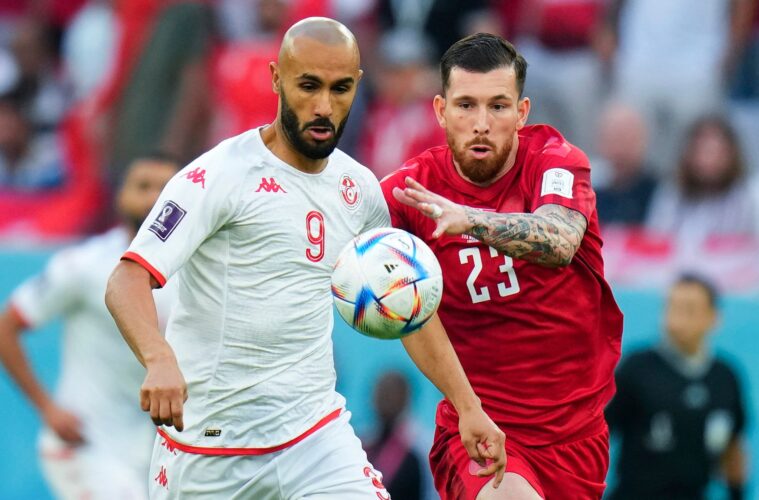As Craig Goodwin belted Mat Leckie’s cross into the roof of the French net on Wednesday, the Socceroos broke a drought that stretched back to Tim Cahill’s momentous volley in Porto Alegre over eight years ago, in scoring at the World Cup from open play.
What proceeded was a quadannual reminder of Australia’s place in the football’s international pecking order, and means they’ll need to snap an even longer drought in Wednesday’s meeting with Tunisia: a World Cup win, something achieved only twice, and not since June 2010.
Ignorance of Tunisian football has been bliss for much of the Australian football public to this point. The Eagles of Carthage have battled through much of 2022 but having reached the World Cup, showed signs in their draw with Denmark that they might be putting it together when it counts.
‘Following their qualifiers earlier this year and their performances at the Africa Cup of Nations, they were one team who we thought were perhaps one of the weaker African sides’, BBC Sport Africa’s Rob Stevens told Box2Box.
‘But against Denmark they really impressed. One thing that stood out was the support they’ve been getting from the Qatari locals and the travelling Tunisia fans, who have made the short trip to Doha. The Education City stadium was absolutely packed with North African red, so it was a kind of home environment for them.’
2022 has been a particularly brutal year in the always competitive world of African football. Tunisia’s early exit from AFCON saw manager Mondher Kabaier moved on ahead of their World Cup qualifier against Mali and while they may not have been convincing, that they’ve reached Qatar while the likes of Nigeria, Egypt, Algeria sit at home commands respect.
‘They scraped their qualifier against Mali, they needed a red card and an own goal in the first leg away in Bamako to get over the line, and in the second leg defended very deeply against a very talented Mali team’, said Stevens.
‘At AFCON they were beaten by a vibrant Burkina Faso side in the quarter-finals, which felt like a disappointment given the calibre of the two teams. Then in recent warm-up matches they weren’t brilliant; they beat Iran behind closed doors a week before the tournament, but in September they lost to Brazil 5-1.’
Kabier’s replacement, 50-year old local Jalel Kadri, has led a nomadic managerial career spanning eleven clubs in fourteen years across Tunisia, Saudi Arabia and the UAE, never spending more than three years in a position. Like Graham Arnold, securing World Cup qualification stands as the greatest achievement of his career.
‘I wouldn’t say he’s a massive name, he’s been promoted from assistant coach. There are people maybe questioning his tactics because their strength is their defence, but in the game against Denmark we saw flashes of what they can do going forward.
‘He didn’t use Wahbi Khazri, the Montpellier attacker, but Youssef Msakni is another experienced forward who missed the last World Cup through injury, so it was great to see him on the world stage threading passes through. Kadri is one of the less-experienced African coaches, but he seems to be getting the best out of his team at the moment.’

